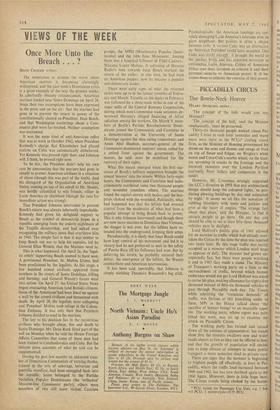VIEWS OF THE WEEK
Once More Unto the Breach . . . ?
BRIAN CROZIER writes:
The temptation to assume the worst about American motives is becoming alarmingly widespread, and the past week's Dominican crisis is a good example of the way the process works. In admittedly obscure circumstances. American marines landed near Santo Domingo on April 28. Since then two assumptions have been expressed in the press and on the air: that the marines had gone in to prevent the return to power of the constitutionally elected ex-President, Juan Bosch, and that Washington mutterings about a Com- munist plot were far-fetched. Neither assumption was warranted.
It was the same kind of anti-American reflex that was at work in October 1962, when President Kennedy's charge that Khrushchev had placed rockets on Cuba was automatically disbelieved. Yet Kennedy was proved right then; and Johnson will, I think, be proved right now.
To be fair, the President didn't help his own case by announcing that the marines had gone in simply to protect American civilians in a situation of chaos (though this, was part of the truth). And his disregard of the OrganiSation of American States, coming on top of his rebuff to Mr. Shastri, was hardly caleulted to win friends, either in Latin America or elsewhere (though the case for immediate action was strong).
That President Johnson intervened to prevent Bosch's return was always inherently improbable. Kennedy had given his delighted support to Bosch as the symbol of democratic hopes in a republic emerging from the orderly nightmare of the Trujillo dictatorship, and had sulked over recognising the military junta that overthrew him in 1963. The simple fact is that it was neither to keep Bosch out nor to help his enemies, led by General Elias Wessin, that the Marines went in.
This is what happened. On April 26, the 'legal- ist rebels' supporting Bosch seemed to have won. A provisional President, Sr. Molina Urena, had been proclaimed by the legalists. At this stage, a few hundred armed civilians appeared from nowhere in the streets of Santo Domingo, killing and burning; and General Wessin's forces went into action. On April 27, the United States Navy began evacuating American (and British) citizens. Some of the Americans'had been lined up against a wall by the armed civilians and threatened with death. By April 28, the legalists were collapsing and 'President' Molina took refuge in the Colom- bian Embassy. It was only then that President Johnson decided to send in the marines.
The key to his decision lies in the mysterious civilians who brought chaos, fire and death to Santo Domingo. Mr. Dean Rusk lifted part of the veil on Monday when he told the House Foreign Affairs Committee that some of these men had been trained in Czechoslovakia and Cuba. But the reticent press accounts of what he said can be supplemented.
During the past few months an unknown num- ber of Dominican Communists of varying shades, trained in the arts of sabotage, terrorism and guerrilla warefare, had been smuggled back into the republic. Some belonged to the ' Partido Socialista Popular Dominicano (the 'orthodox' Moscow-line Communist party); others were members of two still more violent Castrista groups, the MPD (Movimiento Popular Domi- nicano) and the 14th June Movement. Among them was a fanatical follower of Fidel Castro's: Maximo Lopez Molina. A softening of Havana Radio's tone towards Juan Bosch marked the return of the exiles : at one time, he had been an American puppet; now he became a popular and democratic leader.
There were early signs of what the returned exiles were up to in the labour troubles of Febru- ary and March. Trouble on the docks in February was followed by a three-week strike in one of the sugar mills of the Central Romani Corporation, during which non-Communist trade unionists de- nounced Havana's alleged financing of leftist agitation among the workers. On March 9, mem- bers of Boih's Partido. Revolucionario Domi- nicano joined the Communists and Castristas in a demonstration at the University of Santo Domingo against the then ruling triumvirate; and Amin Abel Hasbun, secretary-general of the Communist-dominated students' union, called for a united front against the government. The masses, he said, must be mobilised for the recovery of their rights.
What this meant emerged when the first suc- cesses of Bosch's military supporters brought the armed `masses' into the streets. Within forty-eight hours, the Communists and Castristas had indis- criminately murdered some two thousand people and . wounded countless others. The marines found the capital strewn with bodies and the hos- pitals choked with the wounded. Politically, what had happened was that the leftists had wrested control from the moderates of what had been a popular attempt to bring Bosch back to power. This is why Johnson intervened; and though there are now more marines in Dominica than Vietnam, the danger is not over, for the leftists have re- treated into the underground, keeping their arms.
Paradoxically, it is likely that Juan Bosch could have kept control of his movement and led it to victory had he not preferred to wait in the safety of Puerto Rico till his followers had won. But by deferring his return, he probably ensured their defeat, the emergence of the leftists, the Wessin counterblow and American intervention.
It has been said, inevitably, that Johnson is simply wielding Theodore Roosevelt's big stick.
Psychologically, the American landings are cer- tainly damaging Latin America's relations with its giant neighbour. But politics is often a choice between evils. A second Cuba was an alternative no American President could have accepted. One Cuba was surely enough : it brought the world to the nuclear brink and has exported terrorism to continental Latin America. Critics of American policy owe their freedom to criticise it and their personal security to American power. It ill be- comes them to criticise the exercise of that power.


































 Previous page
Previous page